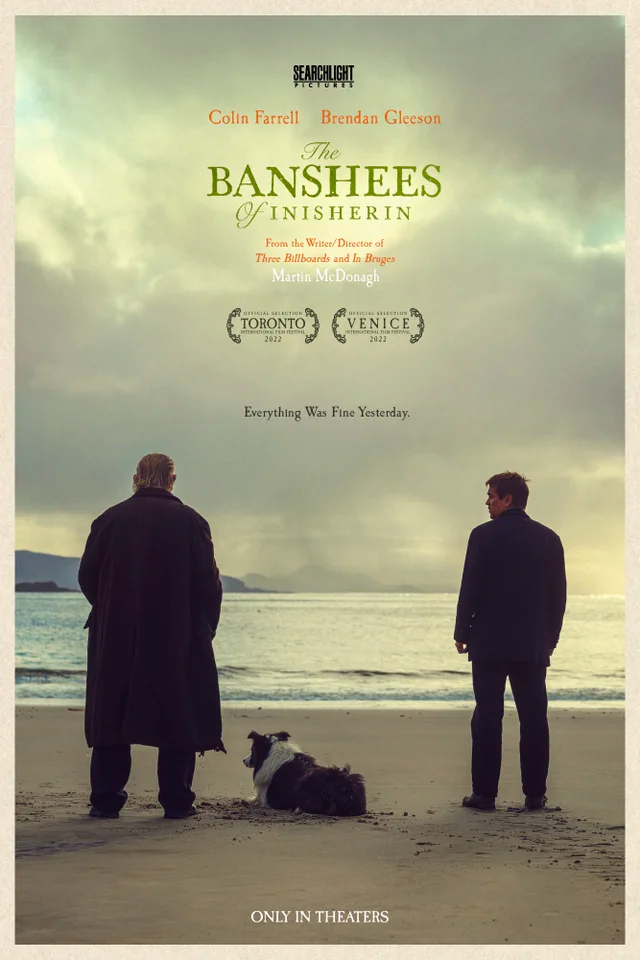THE BANSHEES OF INISHERIN
- nickcassidy16
- Nov 23, 2022
- 4 min read
"The other night, two hours you spent talking to me about the things you found in your little donkey's shite that day." - Colm Doherty

Is it better to be liked or remembered?
Dark comedy continues to have one of the trickiest formulas in cinematic practice. Part comedy, part allegorical realism, part devastation; the melancholic nature and the comedic undertone must compliment each other in a way that simultaneously plants seeds of humor and sadness. Following his previous Best Picture-winning film Three Billboards Outside Ebbing, Missouri, Martin Mcdonagh returns with the insidiously engrossing The Banshees of Inisherin. Throwing caution to the wind in his most obscure project yet, Mcdonagh cunningly illustrates how aching existentialism can breed extreme pettiness. Charming and bleak, the film ponders the concept of legacy and the potentially selfish road an aging man may take to find peace with it.
Banshees follows the dissolution of a friendship between Colm and Padraic. One day, Colm decides to abruptly end his friendship with Padraic. He feels the years of his life coming to an end and wants to spend his time doing ‘worthwhile’ things, like composing music. Padraic, in all his ignorant and stubborn glory, refuses this decision by continuing to visit Colm at his home and the pub down the street. Eventually, Colm tells Padraic if he continues his pestering advances, he will cut a finger off every time he speaks to him, and deliver said finger to his doorstep. In a game of bluffs to see who will yield first, The Banshees of Inisherin tells a simple story about a dismantled friendship saturated with deep-rooted philosophical contexts. Abundant with dry humor and set on a beautiful Irish Island, Mcdonagh curates a world of destitute longing with imagery and language only he knows how to articulate.
What makes a film like this so introspective, and/or potentially polarizing, is the uniqueness in how it navigates its subject. Mcdonagh’s stamp is one of reserved contemplation– the characters nuanced in their unintentional comedic delivery. Their emotional restraint and simpleton nature juxtapose themes dealing with death, solitude and friendship. The atmosphere permeates with boredom and a homeostatic nature of isolated redundancy. Not much happens in the film, and at the same time, everything does– inter-relational politics between townsfolk, parental abuse, familial intricacies, the acceptance of death. The Banshees of Inisherin says so much while saying so little; a philosophical enigma of storytelling Mcdonagh emulates with every frame and sentence of dialogue.
The contemplative essence of this cinema reverberates visually and audibly. Townsfolk walk long roads; the vast depth of the countryside; the ache for new information– the very fibers of this narrative are woven carefully to depict a lifestyle of biding time. The island of Inisherin becomes a character itself, with its misty, foreboding nature and cunning power of observation– watching men cut off fingers and burn down houses in the name of arrogant pride. The idyllic score complimented by long pauses of silence further enhance a reflective and sinister connotation. As Colm fights for inner peace by composing something to leave behind, and Padraic fights to maintain his friendship with Colm, Mcdonagh exploits these lonely characters on an isolated island to traverse intimate topics of ending friendships, the desire to be accepted, and the meaning of life.
Script prowess aside, comedy is part writing, part delivery, and The Banshees of Inisherin easily excels in both. Colin Farrell as the dimwitted, codependent Padraic volleys with Brendan Gleeson’s stoic, obstinate Colm as if the fate of the metaphorical Irish Civil War in the film depends on it. The pauses in their conversations, confusion and arguments that go nowhere, and amusement that oozes from the screen demonstrates a rare combination of actor/director symbiosis. With furrowed eyebrows and demure frustration, Farrell arguably gives his career’s best performance. Gleeson, however, provides a more nuanced one. Threatening to cut off more fingers in exchange for silence, Colm ponders Padraic’s attempts to continue their friendship, but his eyes tell all; how much he still cares for his friend, how absolute he feels in his decision, and his looming sense of despair.
As an epic ensemble, the flow and continuity of the storyline heavily depended on the malleability of its cast. Supporting roles reinforced the success of individual performances, including Carrie Condon’s assured Siobhan and Berry Keoghan’s archetypal village idiot Dominic. Chemistry aside, each character not only reflects insecurity in another, but also personifies interconnected anxieties– Padraic fears mediocrity like Dominic, while Dominic fears never feeling any type of familial love like Padraic and Siobhan, while Siobhan fears never following a more fulfilling path like Colm. Their torment and the ambiguity of their futures does not distract from the overarching metaphorical sentiment surrounding The Banshees of Inisherin, potentially interpreted in a multitude of ways, further complimenting Mcdonagh’s brilliance, but summed up into one; what is the point of life if there is nothing you leave behind? This web of correlative plot points layered with mystical undertones, dark subject matter and comedic cavalcade cannot solely be attributed to the director and writer, in this case both being Mcdonagh, but also the actors as well.
As winding as the Irish countryside, The Banshees of Inisherin encapsulates a thematic amalgamation wrapped in a comedy sketch of philosophical proportions. The dichotomy of it all leaves you with more questions than answers– lighter after all the laughter but heavy because of all the self-revelations. Mcdonagh entraps you in his worlds only to spit out an ambiguous ending he didn't even know. A kooky, hilarious, and graphic drollery, The Banshees of Inisherin exemplifies a risk-taking machine that nurtures its characters and storyline into a powerful force of art.
.jpeg)
Comments